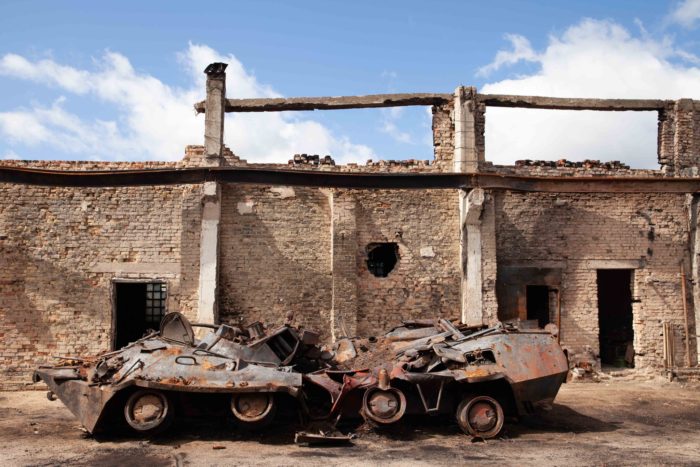The road to the Iveria-Agro farm is littered with evidence of war. Destroyed homes, the shell of a burnt-out car, and walls pockmarked with bullet holes speak to the intensity of violence that overwhelmed the region this past spring.
Located in the village of Shevchenkove, near Brovary in the northeast of Kyiv Oblast, the farm –along with the rest of the area– came under Russian occupation in early March. The village was liberated by Ukrainian forces at the end of the month, with the remainder of Kyiv Oblast cleared of Russian forces by 2 April.
“The occupation, it was a nightmare,” recalled Oleksandr Fishchun, the owner and operator of Iveria-Agro farm. “I was nervous and tense all the time; I tried to call the locals here, but it was hard to connect.”
As most residents fled the Russian advance, it was not until the Russians were pushed out could locals like Fishchun begin to fully grasp the level of destruction brought by the war. The 1,500-hectare farm had been badly damaged and pillaged, emblematic of an experience shared by Ukrainian farmers across the north and east of the country. With the Russian war wreaking havoc on Ukraine's agricultural industry, farms like Iveria-Agro are facing severe challenges to their very existence, forcing them into a situation with potential consequences for the globe.
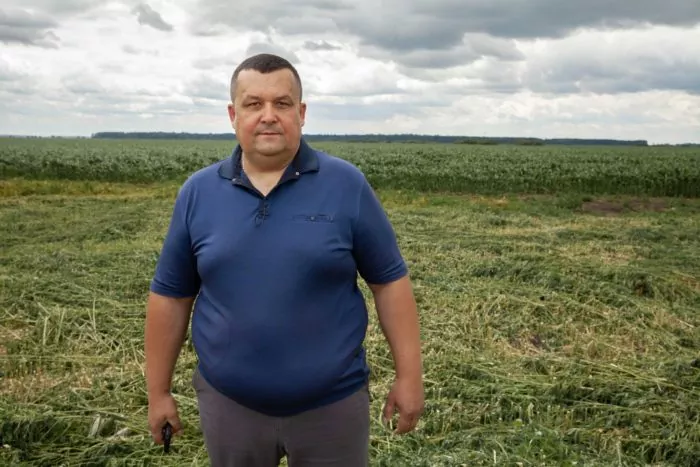
Oleksandr Fishchun has been a farmer all his life. A graduate of Kyiv National Agrarian University, he bought the Iveria-Agro farm ten years ago and now works with his son and 16 other employees. They grow primarily winter wheat, grains, and sunflowers. Fishchun and his family fled Shechenkove before the Russians arrived on March 8th, but for the next three weeks, Russian forces would occupy the farm.
“From the very first moment, they began to damage the farm,” Fishchun explains. “They broke through our gate with an armored vehicle and drove over my son’s new car with a tank, just for fun.”
During their occupation of the farm, Russian forces stole the farm’s diesel supply and fertilizer, destroyed five tractors and trucks, and killed a local man who worked there as a security guard.
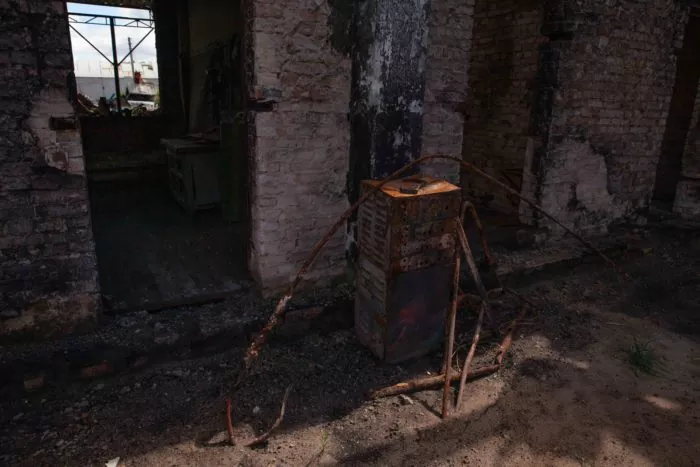
The farm had a large garage and workshop for repairing the farm’s various pieces of equipment. Upon retreating, the Russians destroyed this structure, along with one of their armored vehicles, with a missile to prevent Ukrainian forces from capturing the vehicle. The fields of the farm are now partially scattered with shell holes, fragments, and unexploded munitions. At least one Russian tank was destroyed in a winter wheat field by Ukrainian forces, its turret missing from the burnt-out hull.
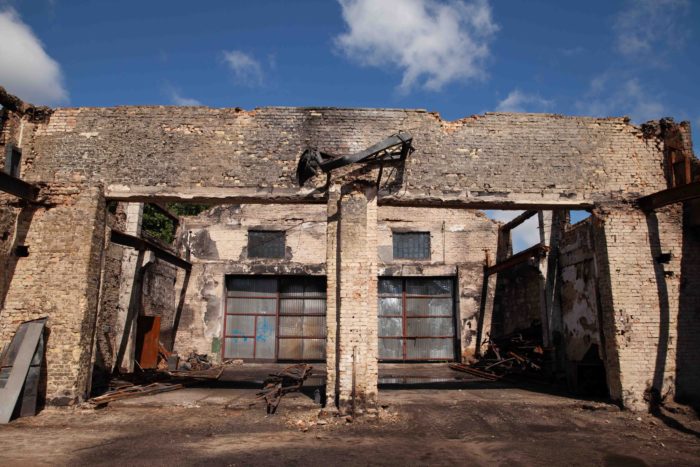
Fishchun estimates that his direct losses in equipment and real estate total around $1.5 million USD. In addition to this, the farm was 15 days late in completing the spring seeding, which will result in fewer crops available for the autumn harvest.
The farm has already lost roughly 220 hectares worth of wheat, while Fishchun expects the autumn harvest to be 35% lower than the previous year's output. Insurance will not cover the war-related damages and so far the Ukrainian state has not provided financial assistance for these losses.
Due to the threat of unexploded shells and other ordinances in the fields, the farm often has to ask the military to scan areas with a drone to check for dangerous munitions. Unexploded ordinances and mines have already taken the lives of farmers working their fields in the nearby Chernihiv, Sumy, and Kharkiv oblasts, with some now working with helmets and body armor.
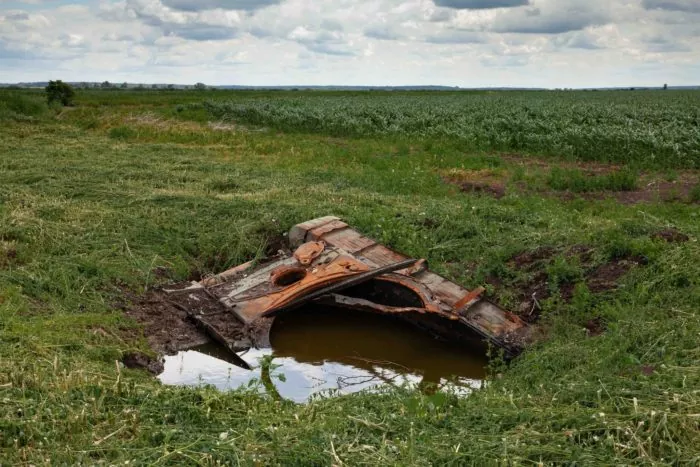
Ihor Melnyk, one farmer in Balakliya (Kharkiv Oblast), owner of DP Ahroheofizyka, has fields that are active sites of fighting and heavily contaminated with explosives. His farm also lost all fertilizers and seeds to the Russian military.
“Without external help, without international help, it will be impossible to do this work,” Melnyk explained.
This situation for these two farmers is far from unique, according to Ivan Miroshynchenko, a member of the Agrarian Policy and Land Relations Committee, Vice President of the Ukrainian Grain Association, and former advisor to the Minister of the Agrarian Policy of Ukraine. Farms all across former or current battlefields have been subjected to similar destruction.
In recent weeks Russian forces have consistently fired missiles and incendiary weapons at wheat fields in an effort to burn the crops. These attacks, combined with the blockade of the Black Sea and the ports needed for export, are placing extreme pressure on Ukraine's agriculture. Miroshynchenko estimates the combined losses of Ukrainian farmers to be between nine to ten billion dollars, an amount that will likely destroy the viability of many farms in the year to come while potentially increasing the chance of famine in nations reliant on Ukrainian agricultural exports.
https://twitter.com/EuromaidanPress/status/1545141325976276999
“We should be fearful not of the spring seeding season of 2022, but of the autumn 2022 and spring of 2023 seeding season,” explained Miroshynchenko. “This means we will not plant in the fall of 2022, less in Spring 2023, and then you will have hunger, because now we have high prices and high amounts of stocks, but next year we will have high prices and less stocks. Then we will have hunger.”
Ukraine currently has 20 million tons of grain in storage.
Due to the blockade of the Black Sea, Ukraine is currently exporting two million tons of grain per month, a substantial decrease from the six million tons per month exported prior to 24 February. The current two million has largely been exported over land to other ports in Europe, though this is expensive for most farmers. On 22 July, a deal brokered by the United Nations was signed allowing Ukraine safe passage from the ports of Odesa, Chornomorsk, and Yuzhny. The following day Russian cruise missiles struck the Odesa port. 1 August saw the first Ukrainian ship leave Odesa under the deal.
For farmers like Fishchun, this moment is long overdue.
“Ukraine is the breadbasket of the world, and we want to continue doing our jobs; we want to keep feeding the world,” he explained.
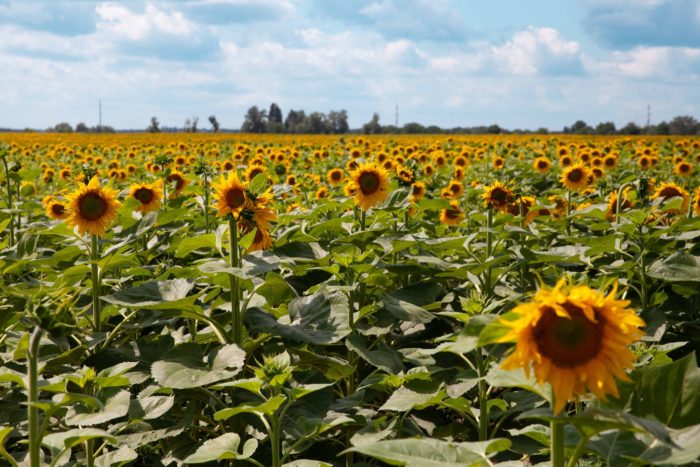
Related:
- The battle for Kherson Oblast: dispatch from the hot zones of war
- Bucha slowly comes to life after Russian massacre: Dispatch from Ukraine
- Russia turned Bucha into one big torture chamber. Dispatch from Ukraine
- The Ukrainian Aleppo, or unprecedented terror in Borodianka – Dispatch from Ukraine

